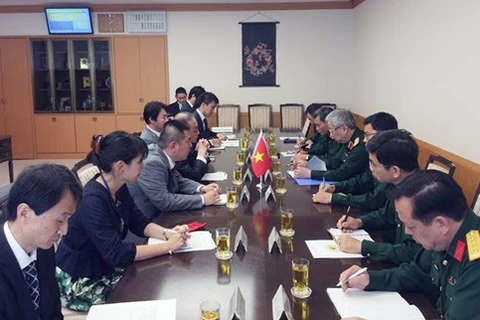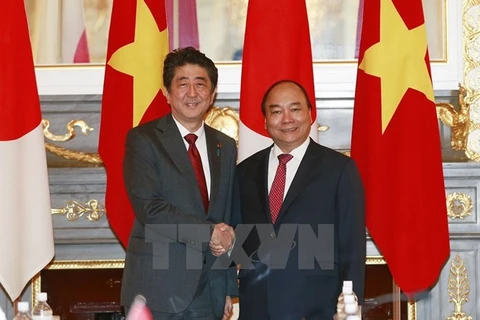Hanoi (VNA) – Vietnam will push ahead with institutional and legal reforms and increase its transparency in line with international practices to attract Japanese investment in the coming time, said Deputy Minister of Planning and Investment Nguyen The Phuong in a recent interview granted to the Vietnam News Agency.
The move is expected to help Vietnam promote its advantages of a dynamic growing economy, a potential consumption market, a strategic manufacturing location, and an important link in the global value chain, he said.
Implementing the policy of active international economic integration, Vietnam has signed 12 new-generation free trade agreements (FTAs) and is undertaking negotiations to ink other important deals in the time ahead, he added.
This creates favourable conditions for foreign investors, including those from Japan, to carry out major projects in Vietnam, especially in the fields of their strength such as high technology and infrastructure.
Vietnam has continuously worked with Japan via special dialogue channels to address difficulties and seek solutions to improve the business environment and increase bilateral investment cooperation, he said.
Such dialogue mechanisms as Vietnam-Japan common initiative; policy dialogue of Keidanren (Japan Business Federation), Vietnam-Keidanren economic dialogue; and policy dialogue between Vietnam’s Ministry of Planning and Investment and the Japan Chamber of Commerce and Industry (JCCI) are being effectively carried out and hailed by the Japanese business community, he noted.
A number of margin activities have been held on the occasion of Prime Minister Nguyen Xuan Phuc’s official visit to Japan to attend the 23rd International Conference on the Future of Asia from June 4-8 to promote trade and investment between the two countries, he said.
The PM talked with representatives from Japanese big companies and had dialogues with Keidanren and entrepreneurs in Kansai region, he added.
From which, it could be said that the PM’s ongoing visit to Japan has received special attention from Japanese businesses, he said, hoping that the flow of Japanese investment will strongly increase in the coming time to live up to the expectations of the two countries’ leaders and people as well as their cooperation potential.
Vietnam and Japan established diplomatic ties in 1973. Since then the bilateral cooperation has been incessantly increased across trade, investment and development cooperation.
Japan is currently the biggest supplier of official development assistance (ODA) for Vietnam, making up about 30 percent of total ODA committed to the Southeast Asian country.
At present, Japan provides about 200 billion JPY (1.8 billion USD) of ODA for Vietnam annually, focusing on fields to promote economic growth and increase global competitive edge; improve social affairs; protect the environment; and enhance administrative management capacity.
Japan is running over 3,400 investment projects in Vietnam with a total registered capital of nearly 44 billion USD. In the first five months of 2017, Japanese businesses poured nearly 2 billion USD in Vietnam. The figure is expected increase in the time to come.
Japan is the fourth biggest trade partner of Vietnam after the US, the EU, and China.
Two-way trade increased to 30 billion USD in 2016 from 16.7 billion USD in 2010.
Japanese foreign direct investment (FDI) has contributed to establishing some key industrial sectors in Vietnam such as telecommunication, oil and gas mining and processing, electronics, and information technology.
According to a survey conducted by the Japan External Trade Organization (JETRO) in 2016, up to 60 percent of Japanese businesses revealed their plan to expand investment in Vietnam.-VNA
The move is expected to help Vietnam promote its advantages of a dynamic growing economy, a potential consumption market, a strategic manufacturing location, and an important link in the global value chain, he said.
Implementing the policy of active international economic integration, Vietnam has signed 12 new-generation free trade agreements (FTAs) and is undertaking negotiations to ink other important deals in the time ahead, he added.
This creates favourable conditions for foreign investors, including those from Japan, to carry out major projects in Vietnam, especially in the fields of their strength such as high technology and infrastructure.
Vietnam has continuously worked with Japan via special dialogue channels to address difficulties and seek solutions to improve the business environment and increase bilateral investment cooperation, he said.
Such dialogue mechanisms as Vietnam-Japan common initiative; policy dialogue of Keidanren (Japan Business Federation), Vietnam-Keidanren economic dialogue; and policy dialogue between Vietnam’s Ministry of Planning and Investment and the Japan Chamber of Commerce and Industry (JCCI) are being effectively carried out and hailed by the Japanese business community, he noted.
A number of margin activities have been held on the occasion of Prime Minister Nguyen Xuan Phuc’s official visit to Japan to attend the 23rd International Conference on the Future of Asia from June 4-8 to promote trade and investment between the two countries, he said.
The PM talked with representatives from Japanese big companies and had dialogues with Keidanren and entrepreneurs in Kansai region, he added.
From which, it could be said that the PM’s ongoing visit to Japan has received special attention from Japanese businesses, he said, hoping that the flow of Japanese investment will strongly increase in the coming time to live up to the expectations of the two countries’ leaders and people as well as their cooperation potential.
Vietnam and Japan established diplomatic ties in 1973. Since then the bilateral cooperation has been incessantly increased across trade, investment and development cooperation.
Japan is currently the biggest supplier of official development assistance (ODA) for Vietnam, making up about 30 percent of total ODA committed to the Southeast Asian country.
At present, Japan provides about 200 billion JPY (1.8 billion USD) of ODA for Vietnam annually, focusing on fields to promote economic growth and increase global competitive edge; improve social affairs; protect the environment; and enhance administrative management capacity.
Japan is running over 3,400 investment projects in Vietnam with a total registered capital of nearly 44 billion USD. In the first five months of 2017, Japanese businesses poured nearly 2 billion USD in Vietnam. The figure is expected increase in the time to come.
Japan is the fourth biggest trade partner of Vietnam after the US, the EU, and China.
Two-way trade increased to 30 billion USD in 2016 from 16.7 billion USD in 2010.
Japanese foreign direct investment (FDI) has contributed to establishing some key industrial sectors in Vietnam such as telecommunication, oil and gas mining and processing, electronics, and information technology.
According to a survey conducted by the Japan External Trade Organization (JETRO) in 2016, up to 60 percent of Japanese businesses revealed their plan to expand investment in Vietnam.-VNA
VNA


























